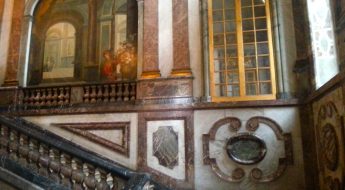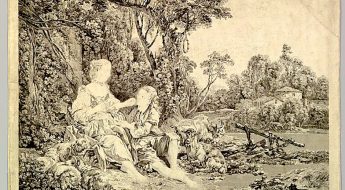Part 3.4 is the fourth of five parts of Chapter 3.
A Childhood at Versailles consists of the first 5 chapters of the memoirs of Mme de Boigne (1781-1866), née Adèle d’Osmond, who was a French salon hostess and writer. She was born in the Château de Versailles and lived at the court of Louis XVI and Marie-Antoinette until her family fled to England during the Revolution. Later in her long life, she married a rich soldier of fortune 30 years her senior, hosted a brilliant salon in Paris, and became an intimate of the last French queen, Marie-Amélie, consort of King Louis Philippe (r. 1830-1848). Childless herself, Mme de Boigne addressed her memoirs to her grandnephew. The memoirs were not published until 1907, under the title Récits d’une tante, or An Aunt’s Tales. They’ve never been published in English, as far as I know, so I’ve decided to translate the first 5 chapters, the ones that take place mainly at Versailles, and post them here on this blog for interested readers to enjoy for free.
The chapters are quite lengthy, so I’ve broken each one into several parts. In Part 3.4, the author recalls the confusion, missteps, and dangers of the events of October, 1789.
A Childhood at Versailles, Chapter 3, Part 4 (3.4)
One day, I was out playing at the home of the little de Guiches, and I was fetched away much earlier than usual. Instead of the servant ordinarily charged with carrying me home, I found my father’s trusted valet. I had an English nursemaid who spoke French badly; she was given a note from my mother. While she was reading it, I returned to my little companions’ room, and already everything was upside down, there was weeping, and packing had got started. I was bundled into a fur-lined coat and the valet took me up in his arms. Then, rather than taking me to my parents,’ he settled me with my nursemaid at the home of an old English master, who lived in a small fourth-floor room in a distant part of town.
The following night I was fetched away to the countryside, where I remained for several days without news from anyone. I was already old enough to suffer a great deal from this exile. It was around the time of the troubles of the month of June and the time of the departure of the Comte d’Artois, his children, and the Polignac family. On my return, I found that the eldest of the little de Guiches was gone and his sister hidden at the home of her maid’s parents. The motive of all this anxiety for us children had been the rumour put about that the people, as a handful of miscreants was then called, were on their way to come and take the nobles’ children away and make hostages of them.
A great fright engendered by this separation remained with me, and when the events of 6 October occurred, my thoughts were occupied by the fear of being sent away from our house.
My parents lodged near the Chateau, but in the town, the apartments given at the Chateau being too inconvenient for people definitively established at Versailles. I do not know who came to warn my father, while he was at table, of the only too well-founded rumours that were beginning to circulate. He promptly presented himself at the Chateau; my mother soon had to go there for Mesdames’ game. However, soon after her departure, the streets of Versailles were inundated with people who were frightful to see and letting out wild cries, to which was added the sound of rifle shots in the distance. All that one could make out from their talk was even more bloodcurdling than their appearance.
Communications with the Chateau were interrupted. When night fell, my mother settled down in a room without lights, and, glued against the closed blinds, tried to guess what was happening from the snatches of conversation she could overhear. I was on her knees, and ended up falling asleep. I was put to bed on a sofa so as not to wake me, and she decided to go find out what was happening herself, taking the arm of the same valet of whom I have already spoken.
She presented herself at several gates of the Chateau without being able to penetrate any of them. Finally, she found a man of the National Guard on duty who recognized her. He said to her: “Go back home, Mme la Marquise, you must not be seen in the street. I cannot let you enter; my orders are too strict. In any case, you would gain nothing by it, for you would be stopped at every door. You have nothing to fear for the persons you are interested in, but there will no longer be a body guard tomorrow morning.”
This was said at nine o’clock in the evening before the massacres started, and nonetheless it was a very gentle and very moderate man, as can be seen from his speech, who was in on this horrible secret, and who was not at all revolted by it, so strong was the sense of vertigo in everyone’s heads.
My mother did not recognize this man at the time, and she found out later that he was a stocking merchant. She returned home, dismayed as one might expect, though a little less disconsolate than at her departure, for the rumours in the streets had it that all the throats were cut at the Chateau.
At midnight, my father arrived. I was woken by the noise and by the joy of seeing him again, but it was not for long. He had come to say goodbye to us and get some money. He gave the order for his horses to be saddled and led by a roundabout way to St. Cyr. His brother, the Abbé d’Osmond, who was accompanying him, was to go with him to wait for them there.
The gentlemen occupied themselves changing their court dress for travel dress. My father loaded his pistols. During this time my mother sewed all the gold that could be found in the house into two belts that she had them put on. All this was a matter of half an hour, and then they left. I wanted to throw myself on my father’s neck. My mother pulled me back with a brusqueness to which I was not accustomed, and by which I remained upset.
The door closed, and then I saw her fall to her knees in an explosion of grief that absorbed all my attention. I understood then that she had wanted to spare my father the useless suffering of witnessing our distress. This practical lesson had a great effect on me, and on no occasion in my life since then have I let myself go in a manner that could aggravate the grief or anxiety of others.
I heard it said that my father, once arrived on the terrace of the Orangery, where the rendezvous was, walked about by himself for a long time. A man enveloped in a cape appeared. It was the Comte de St. Priest, then a minister and a man of sense and courage. They continued their walk for a long time, but no one came and the hour grew later. Uneasy and surprised, they did not know what to think of the reason for the delay in the projected departure of the King, who was to leave for Rambouillet that very night. They did not dare to present themselves in the royal apartments in their traveling costumes; not only would it be contrary to etiquette, it would in the circumstances have given the game away.
M de St. Priest, who lodged in the Chateau, decided to go home to change his clothes, and he arranged to meet my father in an out of the way place. The latter waited a long time for him. Finally, he arrived: “My dear d’Osmond, go reassure your wife — the King is no longer leaving.” And then, gripping his hand: “My friend, M Necker has carried the day; the King and the monarchy alike are lost.”
The King’s departure for Rambouillet had been decided, but the orders for the carriages had been transmitted with the numerous customary formalities as per usual, and the rumour of it had spread. The grooms hesitated to harness the horses, and the coachmen to lead them. The populace gathered in a mob in front of the stables and refused to let the carriages out. M Necker, apprised of the situation, came to lecture the King on the material difficulties of the transport, which came to an end before his speeches did, and it was decided to remain. Going to Rambouillet on a charger, for him who used do twenty leagues on horseback while hunting, would have seemed to him an extremity of which it was impossible to conceive. And there, as at Varennes, the chances of salvation were lost through these princely practices which were second nature for the royal family of France. My father, obliged to go back home to change clothes, did not return to the chateau that night and did not witness the horrors that were committed there.
As soon the King’s consent to his transfer to Paris was given, the gates of the chateau were opened, and my mother returned to her princess. She found the two sisters, Mesdames Adélaïde and Victoire, in their room on the ground floor, with all the shutters closed and a single candle lit. After the first few words, she asked them why they were voluntarily making such a sad day even more sad: “My dear, it is because we are not being shot at as we were this morning,” replied Madame Adélaïde with extreme calm and mildness. That morning all their windows had in fact been fired on and the glass was not intact in any one of them.
My mother remained with them until the moment of departure. She wanted to accompany them, but Mesdames obstinately refused her offer and only accepted this mark of devotion from their chief ladies-in-waiting, the Duchesse de Narbonne and Mme de Chastellux. They followed the sad procession that was carrying the King until Sèvres, and there they took the road for Bellevue. My parents went to join them there the next day.
Nevertheless, the ferment did not calm itself. The agitation was extreme at Versailles, and the threats against my mother were atrocious. It was said the Madame Adélaïde led the King, that my mother led Madame Adélaïde, and that she was therefore at the head of the aristocrats. This talk became so violent that at the end of three days the danger was real, and we left for England.


















I know I have thanked you before, but seriously…thank you for translating and posting these. What a haunting look into the events and emotion of that moment in history.
My pleasure. Thank you for reading!